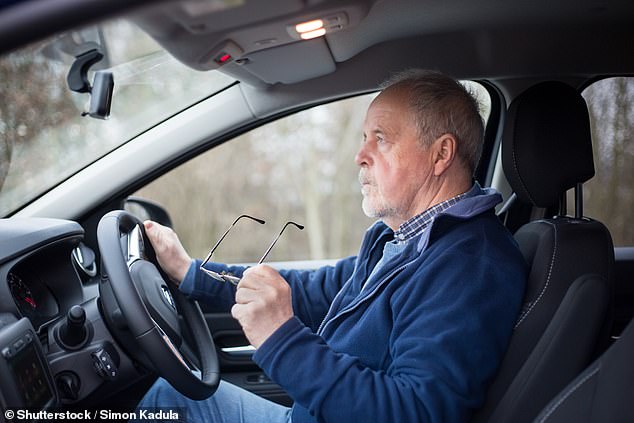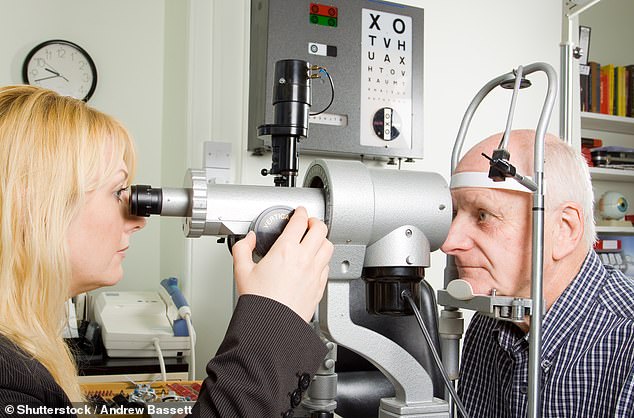Most optometrists have at least one patient a month who drives despite being told their vision is ILLEGAL
Most optometrists say they have seen patients in the past month who are still driving despite being told their vision is not up to legal standards.
Nearly three in five (56 percent) said they have at least one patient who stays on the road despite their poor vision – a sharp increase from two in five in 2019.
Of these, half (51 percent) say they have more than one patient who continues to drive knowing that their eyesight is so poor that it is considered below legal requirements.
The research comes from the Association of Optometrists (AOP), which wants changes to the law requiring all drivers to have their vision checked when they first apply for a driver’s license and each time they renew.
For drivers under the age of 70, a renewal is required every ten years, but for older drivers it is every three years after their 70th birthday.
The findings are supported by a poll of the public which found that as many as one in seven (14 percent) people say they know a family member, friend or colleague is driving, despite eyesight being below the legal standard. A quarter (26 percent) are also concerned about someone they know driving while visually impaired.
Most optometrists say they have seen patients in the past month who are still driving despite being told their eyesight is not up to legal standards, a shocking new report has revealed.
A third (32 percent) of the 910 optometrists surveyed in Britain said the number of patients they advise not to drive due to poor vision has increased over the past three years.
However, there is a clear reluctance among motorists to give up the freedom of the public road.
In a separate poll of 2,081 British adults, only two-thirds of adults with a driving license said they would stop driving completely if a test showed their eyesight had fallen below the legal standard – more than one in twenty (6 percent) would continue to drive normally. .
The shocking report follows a number of high-profile convictions where motorists were told to stop driving by an optometrist or the DVLA.
In one such case, Neil Pemberton from Lancashire was told in 2013 that his eyesight was extremely poor and that he should not drive.
He later took an eye test in 2016 to be told he had no vision in his right eye and very poor vision in his left eye – but informed the DVLA there was nothing wrong with his vision when he renewed his driving licence.
Nearly a decade after being told not to drive, he fatally hit another man crossing the road.
The warning about the number of motorists with inadequate eyesight on the road comes just weeks after police forces across the country rolled out a national road safety campaign to carry out roadside eye checks on drivers.
It was launched to coincide with the turning back of the clocks at the end of October and was extended until November.
‘Operation Dark Night’, supported by the National Police Chiefs’ Council, included roadside vision tests and provided tips for motorists to maintain clear vision in varying lighting conditions.

Motorists are required to read a license plate in good daylight from a distance of 20 meters during the practical exam. Afterwards, their vision may remain unchecked for the rest of their driving career unless they inform the DVLA that their vision has deteriorated
Current eye test for drivers ‘dangerously outdated’
The 1937 Road Traffic Act states that motorists must be able to read a vehicle registration plate from 20 meters (or about 65 feet) in good daylight.
However, there is no requirement for a repeat eye test for the remainder of a person’s driving career unless they notify the DVLA that they believe their eyesight has deteriorated.
The Association of Optometrists says it should not be up to drivers to declare the quality of their eyesight, especially older drivers who must legally renew their license every three years.
Two-thirds (65 percent) of professionals believe the DVLA guidelines are ‘dangerously outdated’ and more than three in five (63 percent) believe they are putting people at unnecessary risk of harm on Britain’s roads.

The Association of Optometrists wants the law changed so that drivers are required to have their eyes checked by a professional every time they renew their driver’s license. For those under 70, that is every 10 years. For older drivers, this is every three years after their 70th birthday
Adam Sampson, chief executive of the AOP, described the study’s findings as a ‘stark reminder of why our roads in Britain are not as safe as they should be’.
He said: ‘In Britain the license plate test is not an adequate test of eyesight. It is only performed once by a driving instructor and not by a trained ophthalmologist.
‘A driver’s vision can then remain unaffected for the rest of his life.’
Adam said this approach is “flawed” and “out of step” with many other countries that use a full vision test to assess whether someone is safe to drive.
“What is deeply concerning is that we have a decade of evidence to highlight the risks and the growing concerns of eye experts,” he continued.
‘Change is never easy. There was strong opposition to drink driving legislation and the mandatory use of seat belts – but these interventions save lives.
‘Our polling shows that the majority of the public supports the idea of mandatory, regular vision tests for all drivers.
‘That is why we are calling on the Department for Transport to update the law so that all drivers must have their eyesight checked and this must be done reliably.’

One in seven British adults surveyed by the AOP said they know a family member, friend or colleague will have poor visibility behind the wheel illegally. A quarter are also concerned about someone they know who drives with poor visibility
Professor Julie-Anne Little, former president of the AOP and research optometrist, said many drivers are unaware that their vision has deteriorated over time and the impact this has on their driving skills.
“Having poor eyesight has been shown to slow reaction times and the ability to drive safely – and it doesn’t take much for one mistake to result in a serious collision with catastrophic consequences,” she explained.
‘As an optometrist I have sometimes had to sit down with a patient to explain that his eyesight is simply no longer good enough to drive a car.
“It’s a difficult conversation, but one that is absolutely necessary: to prevent them from endangering themselves and others.”
Some links in this article may be affiliate links. If you click on it, we may earn a small commission. That helps us fund This Is Money and keep it free to use. We do not write articles to promote products. We do not allow a commercial relationship to compromise our editorial independence.
